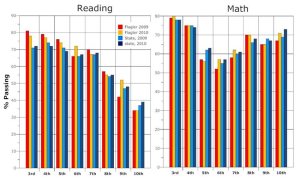Low Test Scores Are the Symptom, Not “the Disease”
Recently my posting has started dropping off because of some nasty fatigue issues that seemed to come out of nowhere. (Hopefully you haven’t noticed the lull too much, as I have quite a few pieces I’m working on at any given time, and researching others.) Sometimes a recent event or flash of insight drives me to squeeze one out in the wee hours of the morning, so I assumed that was the cause of my fatigue issues – and other aches and pains. Things got a lot worse all of a sudden and I decided I needed to go the doc to have him check me out.
Apparently I looked like I felt. First my PCP and then the specialist he sent me too (and every nurse in between) commented immediately on how crappy I looked and how horrible I must feel.
Usually I only go to the doctor when I have a bad sinus infection or cold, or for the occasional physical (or lightning strike like this summer), so I was a little taken aback by these declarations. I didn’t feel great, but this was “my normal” these days so didn’t think of myself in the context of unhealthy. I was just my new normal, basically.
After checking me over the doctor shook his head and dryly asked me if I wanted to continue living. I replied that I hadn’t made any other plans, so thought I’d try sticking around for a while, you know, at least until something better came along. Unfazed by my reply he continued “well, if you want to stick around, you’re going to have to make some changes. For starters you’re going to have to lose 30 or 40 pounds, or anything else I give you in the meantime won’t mean much in the long-term.” I can tell just by looking at your throat and sinuses you have sleep apnea, made a lot worse by being overweight. That high blood pressure you have is probably because of the apnea and partly because you’re overweight. You’ve developed acid reflux, and I see from your chart you have high cholesterol and bad everything else because you are overweight. I can treat your symptoms, we can talk about giving you corrective surgery to fix your unusually long tongue that extends too far back into your throat (yeah, that was as weird hearing that as it sounds reading it) and your really badly deviated septum, but if you don’t fix that weight problem I’m just delaying the inevitable.
Since then I’ve been thinking about my appointment and diagnosis and how it would be a lot easier just to take another pill, when something occurred to me. How I was responding to the situation was exactly how we, as a society, always find it easier to understand and treat the symptoms, and sometimes make things worse.
For instance, I think it’s universally accepted we have a problem with gun related deaths and shootings, although no consensus on what to do about it. In the process of talking about restricting rights and access to guns, gun advocates have actually loosened laws controlling guns, and gun and ammo sales have gone through the roof. We have a gun obsession/culture problem, mental health problems, and a segment of society that feels like government is the enemy and needs to be guarded against, no matter the cost. If we don’t change these root causes of our gun problem, its unlikely any laws or legislation will provide anything but a crude band-aid that may do more damage when it’s torn off than the wound it was designed to protect.
We also have a poverty problem and an income inequality problem. There is a strong correlation between test scores and poverty. This correlation crosses racial, ethnic, regional, and international lines. Low test scores are not the problem, they are the symptom. They are a predictor we can use to identify poverty, just like we can use blood sugar readings to identify folks with diabetes. We can give people drugs to control their blood sugar levels, but this does not cure the diabetes. There is a popular belief running through society and education circles right now, that if we can only raise test scores for impoverished students, we can ignore the poverty. There is a belief that by treating the test scores “symptom,” we will erase the disease of endemic poverty.
Just like being overweight causes all sorts of “symptoms” and ancillary diseases and can be treated with any number of medications and surgeries, the stark reality is that if you don’t treat the underlying problem, the obesity, you are just masking the symptom, not treating the disease. The over reliance on testing and test scores, and the all-consuming drive to raise them is our society’s latest and greatest “miracle pill,” and quite likely a cure that will prove to be much worse than the symptom or even the disease. Test score preachers will have you believe that if we can only fix two things in a child’s, their reading score and math score, the rest of their life will be smooth sailing, problem solved.
In the Atlanta testing scandal (and in the upcoming DC Michele Rhee scandal), teachers and administrators simply changed the scale to distort the readings, by erasing wrong test answers and putting correct ones. In that case nothing happened but altering the test results, yet these “successes” we lauded as proof that test scores could be raised and outcomes dramatically changed. These successes were then touted and exported to other educational markets. Michele Rhee has made a career of touting the importance of falsely raising test scores without ever proving a correlation between her “remedy” and a lasting cure. Now we find many of these miracle cures were nothing more than snake oil, masking the symptoms of the larger poverty disease which still burns and eats away at the core of our society and our children. While now the focus is on the cheating that took place, and punishing those responsible, still we ignore the question of whether raising a test score is a cure in the first place!
It sure would be nice if I could just get a positive airflow machine (ok not really, who wants to wear a mask all night?), fix my sleep apnea and that would be the end of the story. I take plenty of pills that lower all my symptoms (at first it was just one or two but now I’m close to 8 or so) but none of them fix my weight problem. The longer I wait to address my underlying problem, the more pills I will have to take. Eventually I won’t be able to take them anymore. Now you may say, everyone dies. And while that’s true, that doesn’t mean we all have to die tomorrow or be miserable up until the day we finally do kick the bucket.
Raising math and reading test scores is just treating a few very meager symptoms of a very complex problem. A higher test score doesn’t get a poor child to a doctor when they have a medical necessity and need treatment for a real disease. 5 more points on a reading score doesn’t fill a hungry belly, or one subsisting on unhealthy nutritionless sugar-based calories – because they are cheaper and accessible. A slightly higher math score might make a tight-wad billionaire or three feel better about their education agenda, but it doesn’t watch a child in the evenings and make sure they stay out of trouble – while mommy and daddy work two jobs just to put even empty calories on the table. Eliminating music and art teachers from schools to replace them with computers that ceaselessly test and drill your children in exercises might just raise their test scores a little, but that computer doesn’t “get” Picasso and Mozart and it does nothing to feed their souls, or expand their horizons or imaginations.
Raising test scores might make Bill Gates and Rupert Murdoch feel good, but have no illusions about curing the disease of poverty. Actual cures take more resources, more commitment, more money; a more holistic approach, not an absurdly limited one.
Would you believe anyone who tells you that you can eat as much as you want, never exercise, eat only the unhealthiest foods and take 2 little miracle pills and you will live a long and prosperous life? Do you really believe we can ignore all of the challenges poverty brings to children and families, and believe just raising their test scores a few points on a standardized test will make everything ok?
Do you believe that, or is it just easier to believe that. . . and to keep pretending that we don’t have a real problem?
Problem solved!
This blog post has been shared by permission from the author.
Readers wishing to comment on the content are encouraged to do so via the link to the original post.
Find the original post here:
The views expressed by the blogger are not necessarily those of NEPC.

